Carl Franklin’s One False Move (1992): Criterion Blu-ray review
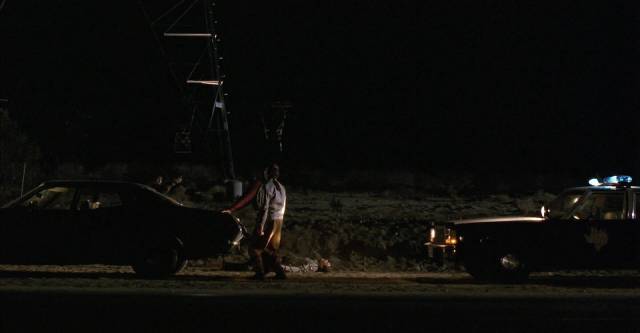
Our response to a movie depends on many things – prior experience, expectations, mood in the moment. When I first saw Carl Franklin’s One False Move (1992) during its original theatrical release, it hit me the wrong way. According to my notes, I rated it quite low. And I know exactly why I reacted negatively: the opening sequence, a pair of home invasions which climax in extremely brutal multiple murders, was so intense and repellent, coming with no set-up, before we know any of the characters, that what we see is a grotesque and disturbing spectacle of cruelty. This overshadows everything which follows and, at the time, I was unable to establish enough distance to see clearly what was going on in the rest of the film.
Since 1992, I’ve seen a great deal of cruelty and gratuitous sadism on screen, from the Saw and Hostel movies to the violence-is-fun attitude of Quentin Tarantino and his many imitators, so watching One False Move for a second time, on Blu-ray from Criterion, proves to be a very different experience. I can see now the filmmaker’s skill and precision, the depth of the writing, the nuanced quality of the performances, and most importantly the ways in which the film works against the genre in which it operates.
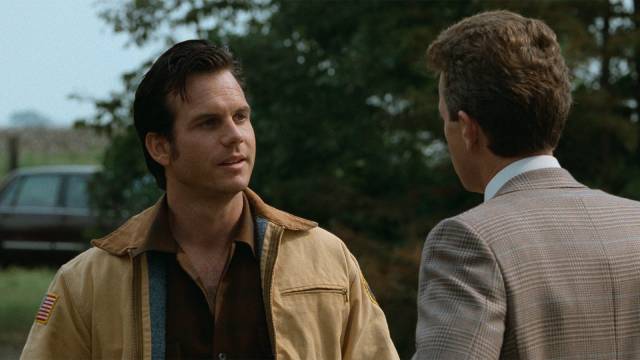
My response is also, no doubt, coloured by the fact that when I first saw it, the only familiar element was Bill Paxton as the protagonist, small town cop Dale “Hurricane” Dixon – a face familiar from supporting roles in genre movies like Aliens (1986) and Near Dark (1987). With the passage of thirty years, the then-unknown Billy Bob Thornton and director Carl Franklin have become very familiar, so the movie can be viewed through the lens of what they have done since. In that sense, One False Move can be seen as a remarkable breakthrough for pretty much everyone involved.
The film began as a spec script written by Thornton and his friend Tom Epperson, which found its way into the hands of producer Jesse Beaton after making the rounds for several years. Beaton approached Franklin on the strength of his AFI thesis film, Punk (1986). A former actor, Franklin had followed that short film with three low-budget features for Roger Corman, none of which suggested what would come from the fortuitous confluence of talents which formed around Thornton and Epperson’s script.

Despite the passage of time and prior knowledge of what’s coming, that opening sequence is still deeply unsettling. It’s meant to be. Franklin establishes an attitude towards violence here which bars passivity on the part of the viewer; he confronts us with the sheer sordid ugliness of violent death, stripped of the genre guardrails which so often transform brutality into something viscerally exciting. This transcends even the home invasion sequence in John McNaughton’s Henry: Portrait of a Serial Killer (1986), which frames the horror as pitch black comedy. The shock to which the audience is subjected here creates a baseline of uneasy expectation which colours everything that follows … but its impact obscures for a while just what it is that follows.
There are two parallel narrative threads in One False Move which gradually draw together and, while things are set in motion by that initial burst of horrific violence and the story is punctuated by three more violent events, the focus turns out to be the characters and the intricate ways in which they intersect and, most importantly, the ways in which events are driven by their flaws and weaknesses. For a relatively low-budget feature dealing with violent criminals, the film isn’t constructed around plot mechanics and spectacle – rather, everything that happens arises from the characters’ decisions which are deeply rooted in their psychological histories, histories which are gradually revealed as they draw together with what feels like ill-fated inevitability.
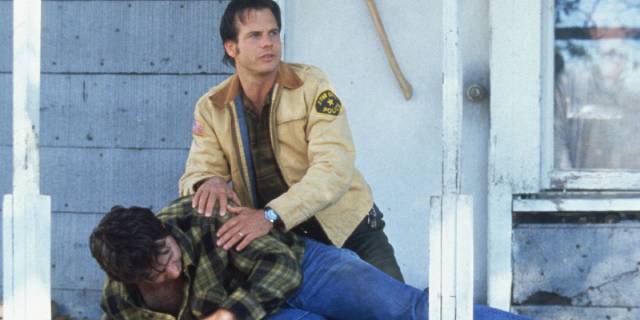
So – it begins in Los Angeles with Fantasia (Cynda Williams) arriving at the house of some friends who are partying. Once inside, she opens the door to her boyfriend Ray (Thornton) and his partner Pluto (Michael Beach), who burst in shouting and waving a gun. As Fantasia watches uneasily, the two men become violent, demanding to know how to find another man, a drug dealer. When they get the information, Ray and Fantasia go to the other address, leaving Pluto with everyone tied up and gagged.
At the other house, Ray brutalizes the dealer and his partner and, after discovering a stash of cocaine and money, he kills the pair by wrapping plastic around their heads as Pluto, in the other house, viciously knifes his hostages to death. None of this was what Fantasia had expected, and yet she essentially set it all in motion. Her relationship with Ray has fatally compromised her, though she is a long way from committing fully to Ray and Pluto’s plans – in the second house, she discovers a young boy hiding and swears to Ray that she found nothing; that act of mercy further impels events because the survival of the boy helps the police identify Ray and Pluto and initiates a cross-country manhunt.
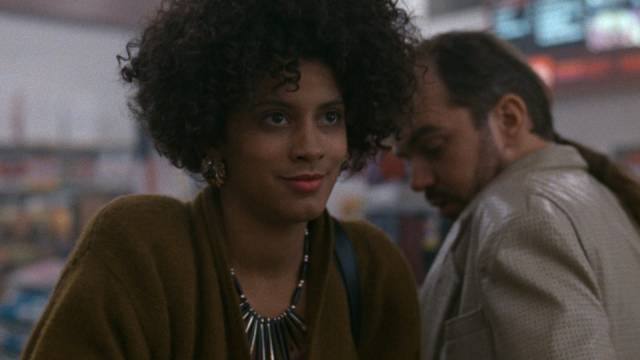
A pair of Los Angeles detectives follow a clue which points to the small town of Star City, Arkansas, where Sheriff Dixon has little to deal with other than the occasional drunk and incidents of spousal abuse. He lives a quiet life with his wife Cheryl Ann (Natalie Canerday) and their eight-year-old daughter Bonnie (Meredith Donovan), a likable hick who is excited at the prospect of being involved in a big crime when the L.A. police call. Anticipating that the killers might be heading to Star City, detectives Dud Cole (Jim Metzler) and McFeely (Earl Billings) fly in to check out Ray’s old uncle. The two big city cops view the sheriff with amused disdain as he puffs himself up and asserts his meagre authority.
Not the least of the script’s departures from conventional storytelling is its presentation of Dixon, who gradually emerges as the protagonist as he passively waits for the action to come to him; he doesn’t instigate events – or rather, it only becomes apparent much later that he has in effect set everything in motion with morally compromised behaviour six years earlier. While he and the two detectives sit and wait, Fantasia and the killers head towards Houston, hoping to sell the drugs to a friend of Ray’s. Despite the two men’s violence, it gradually becomes clear that Fantasia is the centre of this narrative thread, her decisions propelling events.
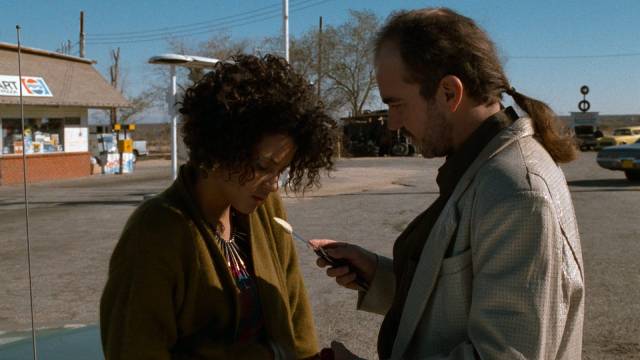
Not only was it her betrayal of her friends back in L.A. which launched the narrative, her choices on the road lead eventually to the climactic confrontation in Star City. Pluto wants to ditch her, but Ray is infatuated. She taunts Pluto, aggravating his antipathy, by being sexually provocative in front of him. And fatefully, when they’re pulled over by a suspicious Texas state trooper, it’s Fantasia who shoots him when his attention is on the two men. This escalation actually serves both Fantasia’s and Pluto’s plans – he insists that it’ll be safer for all of them if they split up and she can take off alone to Star City, which has been her desired destination all along.
Like Ray, she hails from the town, having left five years earlier hoping to make it in Hollywood, leaving behind her newborn son Byron (Robert Anthony Bell). Having put her on a bus, Ray and Pluto head on to Houston, not realizing at first that she has taken all their money. As the two men find the friend in Texas unwilling to help them – leading to another outburst of violence – Fantasia, whose real name is Lila, arrives in town only to be told by her brother Bobby (Jimmy Bridges) that the cops are waiting for her. She just wants to see her son and leave the money for him, but taking the money ensures that Ray and Pluto will be coming after her.
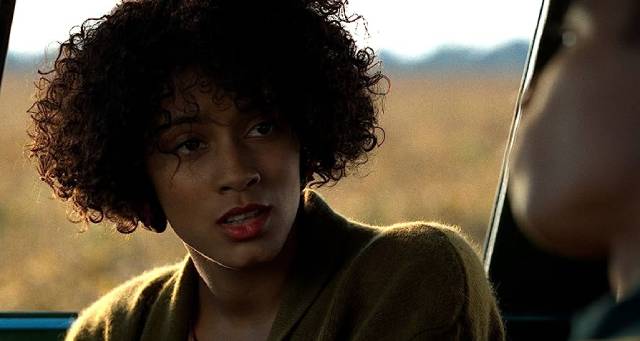
As the threads begin to tighten, Dixon acts alone, following Bobby to the remote abandoned house where Lila is hiding out … and what we’ve begun to suspect finally becomes clear; the sheriff had arrested Lila for a petty crime when she was only seventeen and had abused his authority to pressure her into a sexual relationship. Byron is his own unacknowledged son and his birth made life in Star City untenable for the girl, who headed out in search of a new life, only to find herself caught up in a relationship with petty criminal Ray.
Issues of race, class and gender have been subtly layered throughout the narrative, a tangle of conflicted elements which form the various characters’ sense of identity and influence their very flawed decisions. It’s only in retrospect that the way the script constructs its themes becomes apparent because the pace of events keeps the viewer engaged in the action while the story’s deeper implications simmer just below the surface.
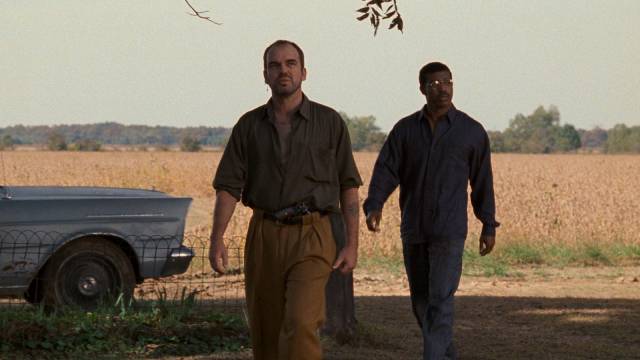
Race is embedded in two parallel triangles – Fantasia, Ray and Pluto echoed by Dixon, Cole and McFeely – and a history which repeats itself in Lila’s life. She and her brother are mixed-race children, their mother having been in a relationship with a married white man who never acknowledged the kids, just as Dixon has never acknowledged Byron. And having run from home, Lila, despite trying to reinvent herself as Fantasia, has fallen into a relationship with a brutal white man who leads her towards a catastrophic collision with her own past.
While superficially a small, independent movie about violent criminals and a morally compromised cop, One False Move is actually a complex character study rooted in fundamental issues which run through American society. While the script was rejected by mainstream Hollywood, it found support in the burgeoning independent scene of the early ’90s. Producer Jesse Beaton got funding from I.R.S. Records, a music company branching out into movies, which proved fortuitous because the company left the production team alone to make the movie they wanted to without the kind of interference all too often imposed by studios. And yet distribution was delayed by a couple of years, with the film probably destined to go directly to video until positive festival reviews persuaded I.R.S. to give it a limited theatrical release – which garnered universally good reviews, leading to a wider release.
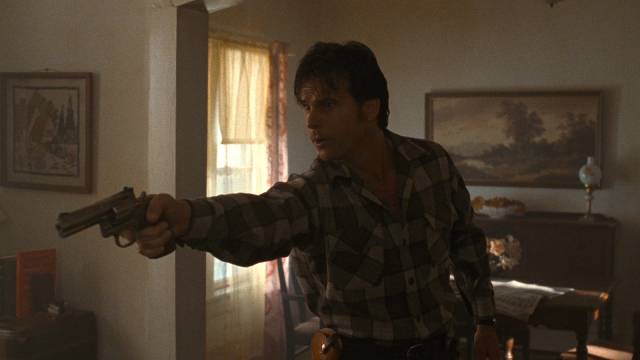
The combination of Thornton and Epperson’s script, Franklin’s assured direction and the excellent cast make One False Move one of the key films of the American indie cinema movement of the late-’80s and ’90s. But although Franklin has had a long career, mostly in television, he’s only made a handful of subsequent features, the best being his adaptation of Walter Mosley’s novel Devil in a Blue Dress (1995), suggesting that the window for something this striking was fairly brief (while Tarantino’s success with Reservoir Dogs in 1992 pointed to a very different approach to violence with a higher box office potential).
The disk
Criterion’s new edition – in both a dual-format 4K UHD/Blu-ray set and stand-alone Blu-ray – presents the film in a gorgeous 4K restoration. James L. Carter’s cinematography provides a range of tones and moods, from the claustrophobic interiors with close-up violence to the expansive exterior landscapes around Star City.
The supplements
While not extensive, the supplements provide an interesting account of the film’s origins, production and release. Carl Franklin’s commentary, recorded for the original DVD release back in 1998, is a relaxed but detailed track which covers both technical issues and an analysis of themes and creative decisions.
Complementing the commentary is a newly recorded conversation between Franklin and Thornton (27:27) in which they cover some of the same ground, while also situating the film as the real launching pad for their respective careers. It’s an interesting glimpse of the creative process and the symbiotic relationship between writer(s) and director. They also cover the struggle to gain a real theatrical release and the film’s critical reception.
There’s also a trailer (1:28) and the booklet essay is by novelist William Boyle.
Comments